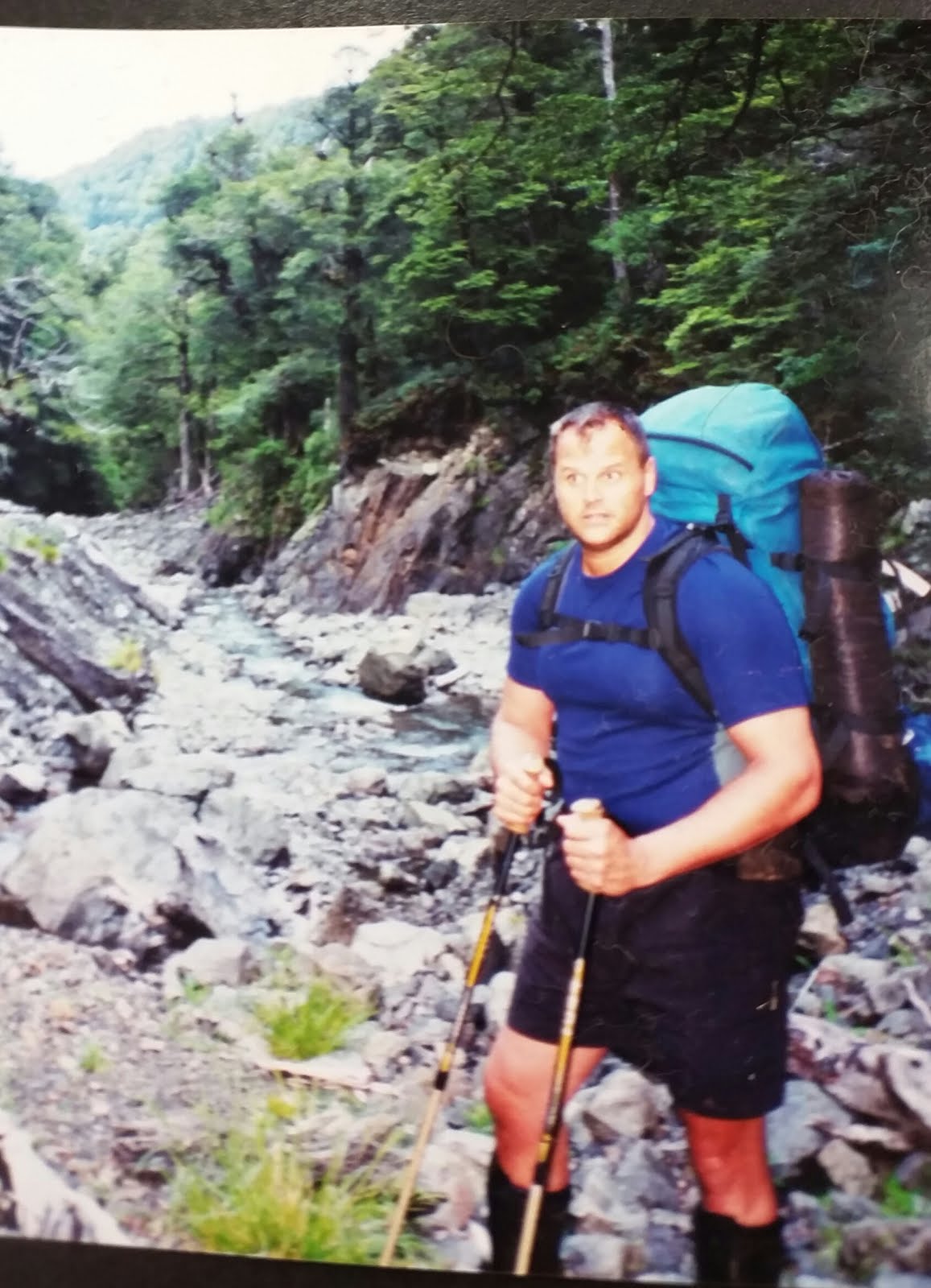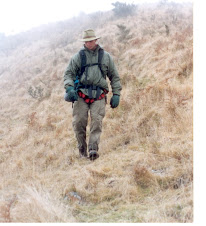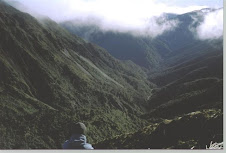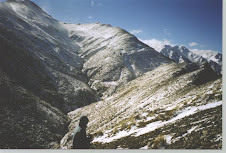 In the past few weeks, I have encountered two separate issues of people in the same boat as I have found, and now find myself in. That being leaving one country to live in another, and then after a period of time being faced with a decision to stay or return to one's original place. My brother in law has lived in Sweden for over a decade and is now deciding to stay there or return here, complicated by his relationship with a lovely Swedish lady who is very attached to her land and her family and realizes the futility of her possibly moving here, as does my brother in law. Tough choices. Another involves someone whose blog I have followed and for her own reasons has decided to leave a place she loves dearly for her original place and family. Both have made me think deeply of my own place, my own choices, then and now, and of course, this place Aotearoa which I have called home now for 15 years. I sometimes wonder exactly why I did leave America to come here, aside from the obvious reason of Tara falling pregnant and us finding out in San Francisco the day before she was due to return here. It makes for an interesting, perhaps even romantic story, how I came over 6 months later, and here we are 15 years, and two boys, down the track. Not as simple a story as it may appear during those intervening years, yet here we are. I wonder sometimes if my motivations were as pure as the story I sometimes tell. A chance for an interesting adventure? An excuse to leave a country I loved some things about and despaired about others? That I loved Tara there was no doubt, but back then we hardly knew each other and it was a sometimes difficult journey and process to learn and grow, to be partners, to be a family, and we still are trying to get there. What keeps me here are my boys, Tara, a few precious friends I have made, and these ranges, the Ruahines. They have become my spiritual realm, matariki huna nui. A Gift among many this land of Aotearoa has given me and anchors my soul, something I have never had in my life before. My experiences with organized religion were dim, and in many ways its entrenchment in parts of America were part of my disillusionment with my own place in it. The Ruahines have brought to me at least the knowledge of something beyond my own temporal state of being. What I am I am still not quite sure, still trying to figure it out, but at least I finally have a place to do just that, or find somehow it seems to come to me when I am there.
In the past few weeks, I have encountered two separate issues of people in the same boat as I have found, and now find myself in. That being leaving one country to live in another, and then after a period of time being faced with a decision to stay or return to one's original place. My brother in law has lived in Sweden for over a decade and is now deciding to stay there or return here, complicated by his relationship with a lovely Swedish lady who is very attached to her land and her family and realizes the futility of her possibly moving here, as does my brother in law. Tough choices. Another involves someone whose blog I have followed and for her own reasons has decided to leave a place she loves dearly for her original place and family. Both have made me think deeply of my own place, my own choices, then and now, and of course, this place Aotearoa which I have called home now for 15 years. I sometimes wonder exactly why I did leave America to come here, aside from the obvious reason of Tara falling pregnant and us finding out in San Francisco the day before she was due to return here. It makes for an interesting, perhaps even romantic story, how I came over 6 months later, and here we are 15 years, and two boys, down the track. Not as simple a story as it may appear during those intervening years, yet here we are. I wonder sometimes if my motivations were as pure as the story I sometimes tell. A chance for an interesting adventure? An excuse to leave a country I loved some things about and despaired about others? That I loved Tara there was no doubt, but back then we hardly knew each other and it was a sometimes difficult journey and process to learn and grow, to be partners, to be a family, and we still are trying to get there. What keeps me here are my boys, Tara, a few precious friends I have made, and these ranges, the Ruahines. They have become my spiritual realm, matariki huna nui. A Gift among many this land of Aotearoa has given me and anchors my soul, something I have never had in my life before. My experiences with organized religion were dim, and in many ways its entrenchment in parts of America were part of my disillusionment with my own place in it. The Ruahines have brought to me at least the knowledge of something beyond my own temporal state of being. What I am I am still not quite sure, still trying to figure it out, but at least I finally have a place to do just that, or find somehow it seems to come to me when I am there.
I have never found being a father or husband comes easy to me. I met Tara relatively late, in my early 30's, rather set in my ways and it could be said both Tara and I are somewhat independent if not solitary people. I am grateful she understands and accepts the part of me which has discovered the Ruahine ranges and what they have become to me. What happens to me in there slowly influences who I am out here, and that has made me slightly better as a man, therefore a father, husband and friend. The fact that means fairly frequent absences as I go find that part of me makes me appreciate and love her, and accept her, all the more. I loved my father, but I often did not like him, and found I took his intense moodiness and anger for my own as I got older. I realize now that my father was simply a man with his own demons, and disappointments and struggles, never able to let it out except with his anger, hurtful words, and fists, and then capable of great and generous love. It was very confusing. It has been a battle for me to recognize that same pain inside me, come to terms with it, and do something about it, or else lose what I most love, even if in my flawed way.
What learning to travel in the Ruahines has most brought to me is calm. That somehow I am just a tiny part of this Whole Thing and if I do not fight it or resist every once in awhile I become awashed in the Glow. Moments of bliss. Being in an area that takes my breath away - both literally and figuratively. The golden tussocks of the open tops, the varied and vibrant greens of the forest, and, of course, the water, from the tiniest trickle of a forest stream, to the lovely symphony of the cold clear rivers, the Ruahines never fail to amaze me. Sometimes I cannot explain the connection, and as I read these poorly written words I struggle now. It gives me something I never asked for, did not deserve, and yet asks nothing of me but to be there. That is as close to religion as I can get.

My thoughts here seem to be going all over the place, but oh well, I have read some excellent writing lately that takes a meandering path to a point, so it is good enough for me. My country, my father, staying, leaving, Tara, my boys, religion, Aotearoa, what am I trying to write here? Perhaps that I fully understand the dilemma the people I know who are struggling to return to a place once home, or stay in a foreign place which has become home. It is easy for me to say or write I left America because of my convictions, but that is not true. There is much I love about America, places like Wisconsin, the Boundary Waters between Minnesota and Canada - a vast area of lakes, huge pine and birch forests where you can hear wolves howl and see black bears and moose roam, and where the timeless granite bones of the earth emerge. The Arizona and Utah deserts, not desolate, but beautiful, and sustaining life and harmony in ways beyond our normal perspectives. The great pine forests of northern Wisconsin where the rivers cut through the ancient lime and sand stone. All places where something inside me was stirred, never truly connected until I came upon the Ruahines. And of course there are the people left behind, my mother, sisters, cousins, nieces and nephews, and many friends, all whom I miss and have missed huge portions of their lives. Modern technology has enabled me to connect and reconnect, such as this format, with my family and some very old important people in my life - that is using technology in a truly positive way. And making friends as we grow older seems to be more difficult. I find myself often going very quiet when I get around discussions about America, particularly with people I do not know. There are often so many assumptions, generalizations, misconceptions, and often simply wrong perceptions of America and I get tired of trying to give my view without being cast as a flag waving patriot. So I simply shut up. Is there much wrong with America? Of course, blatant racism and indigenous issues, materialism, corporate greed, pollution, the ever eroding concept of church and state, and the ever elusive definition of "the American dream". But I could probably make those same arguments about New Zealand, or any other country in the world. The average American is no different than any other average person in any country in the world. We are all far more alike than different, at least in my experience.
So, for me, there is always a melancholic shadow close to me, which is probably my true nature anyway. A feeling of sometimes being caught between two worlds, belonging to neither. And so the pull from what was is always strong, as is the desire for this other world I now live in. A blessing and a curse in some ways. For me, only when I am in the Ruahines do I leave the shadow of melancholy truly behind, or at least come to terms with it. Maybe that is what I was trying to write all along.


"Revelation at Top Maropea"
The hut window frames the Maropea valley
droplets of water shimmer and slide down
to pool on the fly specked frame
black clouds rolled over me
carried by the relentless wind
Grey fingers of mist probe below its rapid path
leaving no stone unturned in its search
seeming to find its way inside my soul even here
I look out upon myself
A single tear rolls down my cheek
I hardly noticed so many have come before
its lonely Journey
there was no surprise at its arrival
Yet this was tear of Beauty
a dam that broke
so I relish its Path
I wait for another
written 18 May,2006 Top Maropea
Photos:
1. On the Whanahuias just past the turn off to Triangle hut. Looking north towards Maungamahue, 1606 meters, on the left upper. I have filled my water bottles in the lovely tarn and it is a cool spot for a break on the way over to Pourangaki hut. Not a bad spot for a high camp as well.
2. Charlie and Taylor
3. Charlie and Taylor
4. Taylor and Tara
5. On the flanks of Maungamahue with the main Ruahine range in the background, east. I have taken this route twice, once climbing to the top of Maungamahue then desending down to continue on to Pourangaki, and the second time sidling around its flank to reach the same point, a somewhat precarious and steep option, but a little shorter. The Whanahuias are one of the five sub ranges which make up the Ruahine range. Each one unique in its own special way, and all leading to very cool places. The Whanahuias, for instance, are very rolling rounded open tops, the tussock takes on a very golden hue, leading into the muted greens of the leatherwood belt before the lush greens of the forest take over. Photos sometimes give the impression that the walking is easy on this lush carpet of rolling hills. This is not the case. Always ahead will be steep going in deep tussock, and beware of wandering into some gut or gully filled with Leatherwood thinking a short cut can be had! Always best to stay high.
6. Just playing in the Pourangaki river, below the hut and swingbridge. There are many deep pools the colour of jade on this part of the river, and after a tough day walk to the Hikurangi tops and back they called out to us strongly.
7. Up high on the spur leading from Pourangaki valley to the Hikurangi tops and also the main Ruahine range. In the background is Sawtooth ridge, which I have been to, but never crossed. All 3 times beaten back by weather. Nice to know such place still await!
8. Pictured below is John on the approach to Maungamahue and now high above the tarn in the first photo. Looking back south on the Whanahuias and the highpoint on the right, unnamed but 1636 meters. The route to Triangle is the dark spur in the middle. I once thought I could save time by cutting through the gullies to the left, then up to the more prominent tops. I learned a valuable lesson, and will not try that again.

The following is a poem written by the late, Aotearoa poet Hone Tuwhare. A great, and sadly little noticed, loss to our land. This poem sums up far better than my own poor offerings and writing, what I feel like I sometimes connect with in the Ruahine ranges. This poem is titled: To Elespie, Ian & their Holy Whanau - it can be found in Hone's 2005 book of poems Oooooo!!!
On life's Eternal river
we float on... and
on, forever - like
a stream of light
enhancing our under-
standing of human love
and life! Kia ora!












